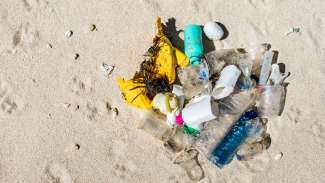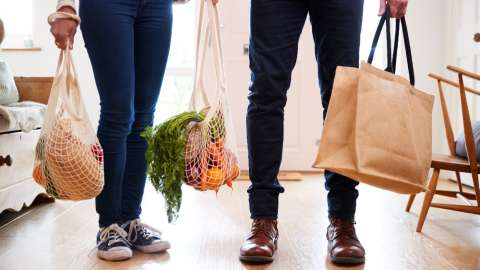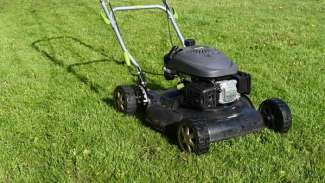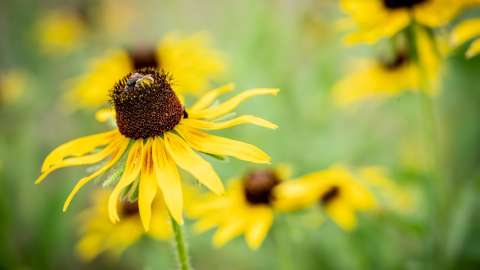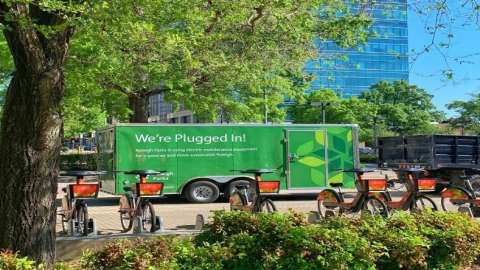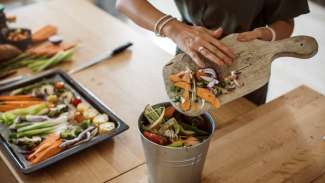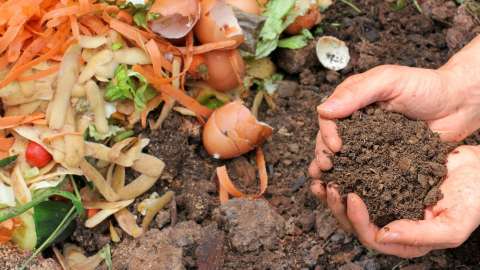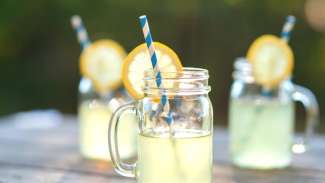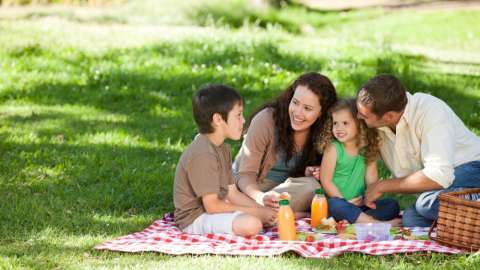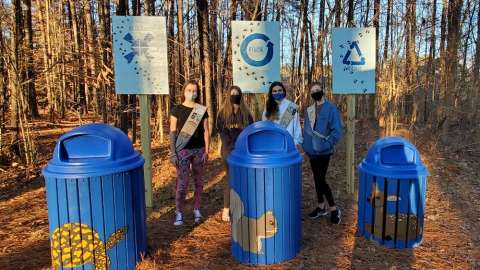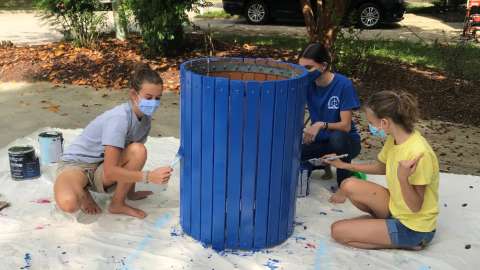Jump To:
Plastic Free July
July is full of summer traditions from fireworks to outdoor picnics, pool time to backyard BBQs. Why not add one more tradition to the list – Plastic Free July!
Plastic Free July is a global movement helping people to be part of the solution to clean our lakes, wetlands, and communities of unsightly and environmentally damaging plastic debris. Plastic is made to last, yet 33% of plastics (plastic bags, cups, and straws) are used only once and then thrown away. These plastics are not biodegradable: they break up into smaller pieces that seep into our groundwater, affecting wildlife and human health. Plastic often finds its way into our waterways – in fact, it’s estimated that by 2050 there could be more plastic by weight than fish in the sea.
With plastic production increasing by 40% over the next decade and less than 10% of plastics actually recycled, it is becoming even more pressing to act now to reduce our single use plastic consumption - the disposable, non-biodegradable plastic that is beginning to permeate all parts of our lives.
Our parks and preserves contain lakes, ponds, streams, and wetlands, just to name a few. Keeping plastic out of that water is an important part of maintaining and protecting the natural environments in our communities – it keeps those spaces beautiful for visitors and provides healthier habitats for wildlife as well.
Thinking about how you can make an impact on plastic waste this month? Here are some ways to help the water in our parks and preserves become – and stay – plastic-free:
- Bring a reusable water bottle when you visit – if you need a refill, stop by a water fountain to fill up!
- Pack an eco-friendly picnic that will let you enjoy your favorite park without worrying about waste.
- Find a trash can for any trash you might have…if there isn’t one close by, secure the trash in a safe place until you find one. It’s easy for small bits of plastic and other trash to fall out of our pockets as we walk!
- Carry a small trash bag and gloves when you go for a hike…if you see plastic or other trash on the ground, you can help remove it before it makes its way into the water.
- Carry your water bottle and other supplies for your visit in a cloth bag, backpack, or other reusable container.
- Check out the volunteer page for ways to stay involved in keeping our parks and preserves clean throughout the year: in the next month, there are opportunities to join us for Trash Cleanup Days at Durant Nature Preserve and Walnut Creek Wetland Park.
- Ask friends and family about ways they reduce their plastic consumption at home, school, work, and out in their communities.
No matter how small the step, if we implement a few changes we can make a BIG difference on the plastic waste in our communities!
Is the Grass Always Greener?
Every year, in the quest to keep lawns green and manicured, the Natural Resources Defense Council estimates we are consuming 3 trillion gallons of water, 200 million gallons of gas, and 70 million pounds of pesticides – not to mention untold hours away from our families and friends tending to the chores related to lawn care. All this green grass is doing more harm than good. Pesticides and fertilizers can run off through storm drains and get into our waterways where they can wreak havoc with aquatic life and water quality. Many areas of the country are experiencing severe drought were finding enough water for even basic needs, let alone watering lawns, is becoming difficult. No matter where we live, we all feel the effects of climate change as a result of burning fossil fuels – to which our gas-powered mowers contribute.
The good news is that when it comes to maintaining yard space, there are lots of options to consider that will reduce carbon footprint, conserve water, and reclaim time lost to lawn maintenance. Horseshoe Farm Nature Preserve is an example of what is being done in Raleigh Parks to transition to greener solutions that are more sustainable and better for the environment. For example, the preserve was planted with thousands of native plants! Native plants are accustomed to weather conditions in the region and can withstand periods of drought and heat, thereby reducing the need to water them. All these natives take the place of grass, providing a nice aesthetic in their own right, while also making great habitat for birds, insects, and other wildlife that depend on plants for food and shelter.
There has also been a significant reduction in the area of mowing at Horseshoe Farm to allow for natural meadow habitat. By making this change, we not only helped our wildlife, but helped ourselves by rediverting staff time needed for mowing to other projects while also saving money and reducing emissions.
Raleigh Parks is proud to have launched a pilot program using electric equipment to maintain our parks. With so many options on the market, it is becoming easier and more cost effective to use electric mowers, trimmers, and blowers to help us do basic upkeep. Aside from using less emissions, another bonus to using electric equipment is how quiet they are so we do not distract from the peaceful experience so many of our visitors come to our parks and preserves to enjoy.
Imagine the cumulative impact we could make if everyone adopted just a small change in maintaining their yards! There are so many great ideas out there to inspire action like xeriscaping with rock and succulent gardens, planting native wildflower gardens, and devoting some of your yard space for vegetable gardens. There is sure to be something out there that you can adopt on as big or little of a scale that feels right to you.
Join us for our Sustainability Stewards programs at Horseshoe Farm Nature Preserve this summer where we’ll be talking more about how Horseshoe Farm is championing sustainable practices in our parks!
Put Food Waste In Its Place
Did you know that each year, the United States wastes about 8 billion pounds of food? This is nearly a third of our total food supply and measures up to about 219 pounds wasted per American. While this might seem like an issue that doesn’t affect us personally, most of the food waste takes place in our own homes. The average American household wastes about 43% of all food brought into the home. That’s actually more than the amount of food wasted in restaurants and grocery stores (40%), farms (16%), or manufacturing (2%). When food goes to the trash instead of our plates, it has a significant impact on our environment. Landfills are filling up with unused or old foods that emit methane, a potent greenhouse gas that contributes to climate change. The carbon footprint of food wasted is equivalent to the emissions of 37 million cars! So, how do we begin to solve this issue?
The easiest way is to make sure you are using your food before the use-by date. Be sure to notice or read the dates in the store to decide if you will be able to use it before it goes bad, and buy only what you need. This will limit the amount of excess food brought into your home, thereby limiting the amount of waste. You should also plan to use highly perishable foods as soon as possible to reduce the risk of them spoiling.
A fun way to involve the whole family in reducing your food waste is by composting. Composting is the act of reusing your old food by turning it into compost (a plant fertilizer made from organic materials). International Composting Awareness Week happens in early May each year, so now is a great time to start your composting journey! You don’t need a fancy compost machine to do this. An old plastic bin with a lid will work just fine. Holes can be drilled into the side to give oxygen to the compost. You can place any vegetable in the bin, along with yard clippings, dirt, and most fruits. Make sure you are not placing any meat in compost bins! Also, you should make sure your compost bin is maintaining a 1-part green (clippings/vegetables), to 3 parts brown (dirt/fertilizer/compost). You can use your compost to fertilize plants. Learn more about ways to compost.
It will take many hands working together to reduce food waste and tackle climate change. Sometimes, it might mean getting our hands dirty – with nutrient-filled, composted soil!
Operation Tee to Tote
Raleigh Parks is working with Community Climate Interns who are working to create a more sustainable future for Raleigh and lower overall Greenhouse Gas (GHG) emissions. One intern, Camille Ingram, is putting together a project that will have a long-lasting environmental impact on the local community. With the help of Activate-Good (a local volunteer organization), Camille will be working on giving new life to used City of Raleigh staff shirts by turning them into stylish reusable tote bags! These totes will be given out to City of Raleigh summer campers, members of the community, and new City of Raleigh staff to encourage re-use instead of single-use and to reinforce the City’s commitment to sustainability and climate action.
Single-use plastic bags don’t really decompose, instead, they eventually break up into smaller pieces of plastic that can get in into our food chain, waterways, and soil. In addition to keeping plastic out of our environment, each reusable tote can help save up to 33 grams of Carbon Dioxide. In total, with 300 converted tees to totes, we can help save an estimated 9,900 grams of CO2!
Be change-makers by making one of these fun and creative tote bags for yourself! These bags can serve as a lunch bag, a bag for groceries the next time you are at the store, or just an environmentally friendly and sustainable way to carry anything you need.
Eco-Friendly Picnics
Warmer weather, longer days, and beautiful parks are the perfect recipe for a favorite springtime activity – picnics! We’re all itching to get outside this time of year, and what better way to enjoy the outdoors than to share a casual meal in one of our nature preserves! Laying out a blanket and finding a picnic table is the easy part – planning and packing your food takes a little more effort. Picnics don’t have to be hard to pull together and they can even be planned to leave less waste or better yet, leave no trace!
Here are our favorite tips and tricks for planning a sustainable picnic that will lower your waste footprint:
- Bring a blanket, sheet, or reusable tablecloth from home instead of a single-use plastic table cover. This will make your picnic cozier and there’s no waste left behind!
- Use bandanas or cloth kitchen towels instead of paper towels and napkins.
- Ditch single-use plastic water bottles and pack water in reusable containers. Do the same for food: Tupperware, mason jars, beeswax wraps, and silicone bags are some great reusable solutions that save money and reduce waste.
- Plan a finger-food menu to eliminate the need for utensils. It’s one less thing you’ll have to bring!
- Keep it simple: fresh fruits, deli meat, a bit of cheese, and a baguette are all delicious and easy to pack!
- Use a reusable grocery tote, basket, backpack, or paper bag that can be recycled to carry your picnic supplies in.
Consider walking or biking to the park if you live close by. This will reduce your carbon footprint even more and provide some exercise at the same time! Plan for an after-picnic activity by bringing a frisbee or a kite, or simply take advantage of one of the many scenic nature trails in our preserves for a post-picnic stroll.
Here’s the scoop on some of our favorite picnic spots:
- Annie Louise Wilkerson, MD Nature Preserve – The picnic shelter provides cool breezes and the nearby nature play area offers a great place for kids to play.
- Durant Nature Preserve – Check out the picnic tables at the lower lake. Odds are you’ll find a Great Blue Heron out hunting for fish and turtles basking on logs.
- Forest Ridge Park – Grab your picnic blanket and walk to the end of Old 98 for a picnic by the waterfront. This spot disappears when the water levels are high, so if you can’t find it, head to the large field to place your blanket.
- Horseshoe Farm Nature Preserve – The meadow is the perfect place to lay out a blanket and throw a frisbee. Plan your visit right before sunset for an amazing view!
- Lake Wheeler Park – Head toward the volleyball court, then set up a picnic blanket on the grass mound by the old oak tree. When you’re finished with your picnic, take a walk to the playground or the waterfront for additional outdoor time.
Reduce, Reuse, Recycle
In December 2019, four Girl Scouts of Girl Scout Troop 14 were looking for a project idea for their Silver Award, the second-highest award a Girl Scout can achieve. They approached Durant Nature Preserve staff, explaining they would like for their project to make a positive impact on the environment and help our staff solve a problem we were experiencing in the preserve. During the initial meeting with the Girl Scouts, Durant staff commented that a lot of recyclable materials, especially plastic water bottles, were ending up in the trash bins instead of the recycling bins at the most popular and heavily-used picnic shelter. Staff also discussed how wildlife in the preserve are impacted when plastic pollution washes into the lakes and creeks at Durant after each storm event. The Girl Scouts decided to figure out a way to make Durant’s recycling bins stand apart from the trash bins and to educate the shelter users about the 3 Rs: Reduce, Reuse, and Recycle.
The Girl Scout Troop had a creative and fun idea to paint each of the recycling bins with an animal native to Durant to help make the connection that recycling our waste is important for the health and protection of our native wildlife. We also hoped the recycling cans would visually pop to encourage more folks to use the cans for their intended purpose! Three new signs were built and painted to accompany the newly-painted cans, emphasizing the 3 Rs. They also created fun takeaway tips and ideas that can be done at home, work, and school to put the 3 Rs into practice. The revived recycling bins will get lots of use and the tips for reducing, reusing, and recycling will provide inspiration and encouragement towards practicing a sustainable lifestyle.
Sustainability Tips
Reduce
- Avoid buying goods that are overpackaged – look for items that are sold without plastic wrapping
- Try fixing things instead of throwing them away and buying new
- Use washable table napkins and towels in place of paper napkins and towels
- Plant native plants – they are drought resistant and require much less water
Reuse
- Use a reusable water bottle instead of single-use plastic water bottles
- Donate old clothes, toys, and furniture so someone else can use them
- Use reusable bags when grocery shopping to avoid using single-use plastic bags
- Bring a reusable container with you to restaurants to package leftovers
Recycle
- Buy products made from recycled materials
- Be sure to recycle plastic, cardboard, paper, aluminum, and glass into recycling receptacles. Learn more about the City of Raleigh’s curbside recycling program.
- Compost bins are a great way to reduce the amount of trash in our landfills plus recycle your food waste into compost for your garden!
